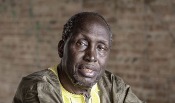By Kemuel Othieno
Ngũgĩ wa Thiong’o, the titan of world literature, scholar and political activist, died in Atlanta, USA on Wednesday, 28th May 2025 aged 87.
The writer’s death was announced by his daughter Wanjiku wa Ngũgĩ in a Facebook post on the evening that he died.
The work of Ngũgĩ is some of the best-regarded in all of Africa’s history, dealing with the complexities of the post-colonial landscape through prose and plays. Some of his most notable works include Petals of Blood (1977), The River Between (1965) and Weep Not, Child (1964). It is the strength of Ngũgĩ wa Thiong’o’s oeuvre that saw him awarded some of the most prestigious literary awards.
Ngũgĩ wa Thiong’o was born in 1938, in a Kenya that was under the brutal heel of British oppression. He witnessed various uprisings against the British, including the Mau Mau resistance and was at the scene of some of the colonial regime’s worst atrocities. His own father’s land was seized by the British, and two of his brothers killed by the regime.
It is no surprise that as Kenya emerged into an era of independence, Ngũgĩ was penning one of the most damning indictments on colonial policy. His novel Weep Not, Child captured the rifts and divisions that were formed in Kenyan communities with the solidification of colonial rule.
His later works focused on the improvement of the human condition in Kenya, decrying the emerging dictatorship and rampant corruption. It was the works he published during this era that also acknowledged the spectre of colonial rule in Africa— neo-colonialism. The works he published during this time were written first in his native Gikuyu before being translated to English. It was during this time as well that Ngũgĩ incurred the wrath of the Kenyan state and the then Vice President Daniel arap Moi. The publication of his Gikuyu play I Will Marry When I Want led to his incarceration in 1977, before being released in 1978.
Ngũgĩ went into exile in the US shortly after his release, where he served as a professor of English and comparative literature at the University of California, Irvine. He returned from exile in 2004 after Daniel arap Moi stepped down, but was attacked in his Nairobi home, and his wife was raped.
He continued writing and translating his own work well into his later years, with his novel-in-verse The Perfect Nine receiving a nomination for the International Booker Prize, becoming the first nominee to write in an indigenous African language and the first nominee to also translate their own nominated work.
Through his work, Ngũgĩ was able to capture the desperation of a starving and suffering people, he was able to capture their resurging hope even in the face of unfathomable adversity, and was able to stare down that adversity himself and spit in its face. Ngũgĩ wa Thiong’o has completed for himself the most important lesson he ever taught the readers; we are all walking toward Bethlehem to be born again.
La Luta Continua!


